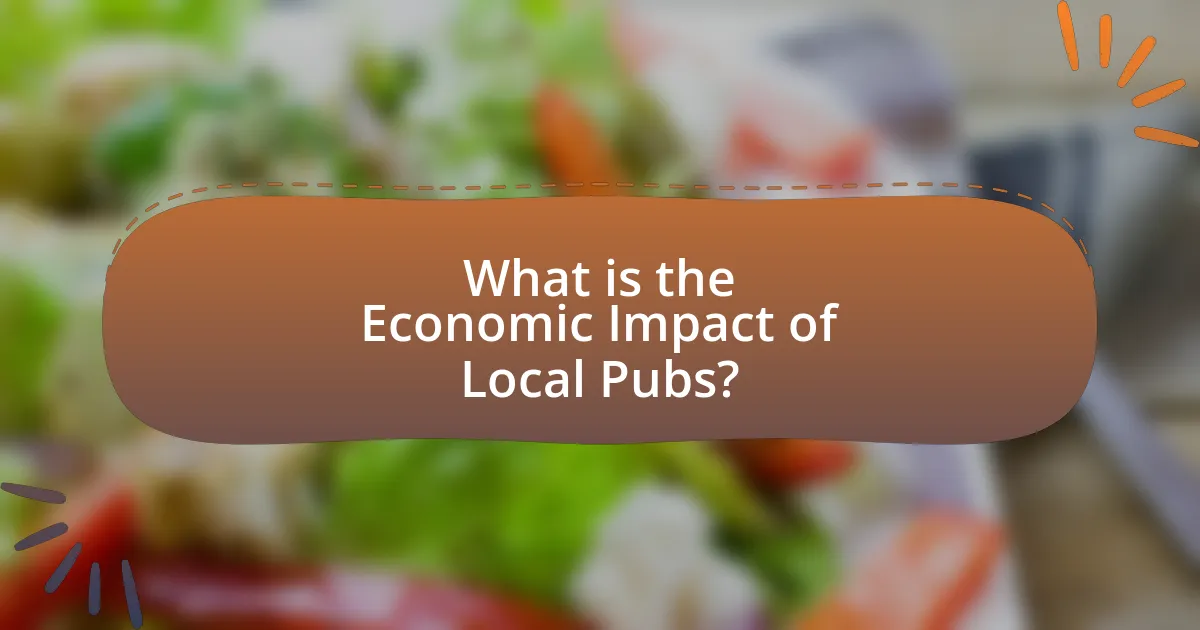Local pubs serve as crucial economic and social hubs, significantly impacting local economies through job creation, community engagement, and support for local suppliers. The UK pub sector employs over 900,000 individuals and contributes approximately £23 billion annually to the economy. This article analyzes the multifaceted economic contributions of local pubs, including their revenue sources, role in community development, challenges faced, and strategies for enhancing profitability. It also examines the effects of changing consumer preferences and regulatory challenges on the viability of these establishments, highlighting the importance of local pubs in fostering community ties and stimulating local spending.

What is the Economic Impact of Local Pubs?
Local pubs significantly contribute to the economy by generating employment, stimulating local spending, and supporting community cohesion. According to a report by the British Beer and Pub Association, the pub sector employs over 900,000 people in the UK and contributes approximately £23 billion to the economy annually. Furthermore, local pubs often source products from nearby suppliers, which enhances local businesses and fosters economic interdependence. This interconnectedness not only boosts local economies but also strengthens community ties, making local pubs vital economic and social hubs.
How do local pubs contribute to the local economy?
Local pubs contribute to the local economy by generating revenue through sales, creating jobs, and fostering community engagement. They provide employment opportunities, with the UK pub sector alone supporting over 900,000 jobs as of 2021, according to the British Beer and Pub Association. Additionally, local pubs stimulate local businesses by sourcing food and supplies from nearby vendors, thereby enhancing the economic ecosystem. They also attract tourism and social gatherings, which further boosts spending in the area.
What are the primary revenue sources for local pubs?
The primary revenue sources for local pubs include alcohol sales, food sales, and entertainment offerings. Alcohol sales typically account for the largest portion of revenue, with beer, wine, and spirits being the main products sold. According to the British Beer and Pub Association, pubs in the UK generated approximately £23 billion from beer sales alone in 2019. Food sales, including meals and snacks, contribute significantly as well, with many pubs offering dining options that attract customers. Additionally, entertainment such as live music, quiz nights, and sports screenings can generate extra income, enhancing the overall profitability of local pubs.
How do local pubs create jobs in the community?
Local pubs create jobs in the community by employing staff for various roles such as bartenders, servers, cooks, and maintenance workers. These establishments contribute to local employment rates, with the British Beer and Pub Association reporting that pubs support over 900,000 jobs across the UK. Additionally, local pubs often source products from nearby suppliers, further stimulating job creation in sectors like agriculture and manufacturing. This interconnectedness enhances the local economy, as each job created in a pub can lead to additional employment opportunities in related industries.
What role do local pubs play in community development?
Local pubs play a significant role in community development by serving as social hubs that foster connections among residents. These establishments contribute to local economies by creating jobs, generating tax revenue, and supporting local suppliers, which enhances economic stability. For instance, a study by the Campaign for Real Ale (CAMRA) found that every pub supports approximately 30 jobs in the local area, highlighting their importance in employment. Additionally, local pubs often host community events, which strengthen social ties and promote civic engagement, further solidifying their role in community cohesion and development.
How do local pubs foster social interactions and community ties?
Local pubs foster social interactions and community ties by serving as communal spaces where individuals gather, share experiences, and build relationships. These establishments often host events such as trivia nights, live music, and community fundraisers, which encourage participation and interaction among patrons. Research indicates that local pubs contribute to social cohesion; for example, a study by the University of Kent found that regular visits to local pubs enhance feelings of belonging and community engagement. Additionally, the informal atmosphere of pubs allows for spontaneous conversations and connections, further strengthening community bonds.
What impact do local pubs have on local tourism?
Local pubs significantly enhance local tourism by providing unique cultural experiences and social hubs for visitors. They attract tourists seeking authentic local cuisine, craft beverages, and a sense of community, which can lead to increased spending in the area. According to a study by the Campaign for Real Ale (CAMRA), pubs contribute approximately £23 billion to the UK economy annually, with a substantial portion stemming from tourism-related activities. This economic impact is further evidenced by the fact that 70% of tourists reported visiting a pub during their stay, highlighting the role of local pubs as essential components of the tourism experience.

What are the Challenges Facing Local Pubs?
Local pubs face several significant challenges, including increased competition from chain establishments, changing consumer preferences, and rising operational costs. The proliferation of large pub chains and bars has intensified competition, making it difficult for local pubs to attract and retain customers. Additionally, consumer preferences have shifted towards craft beverages and unique dining experiences, which may not align with traditional pub offerings. Rising costs, particularly in rent, utilities, and labor, further strain the financial viability of local pubs. According to a report by the British Beer and Pub Association, over 1,000 pubs closed in the UK in 2020 alone, highlighting the severe impact of these challenges on the local pub industry.
How do economic downturns affect local pubs?
Economic downturns negatively impact local pubs by reducing consumer spending on discretionary items, including dining and drinking out. During such periods, patrons often cut back on visits to pubs, leading to decreased foot traffic and lower sales. For instance, a study by the British Beer and Pub Association reported that during the 2008 financial crisis, pub closures increased significantly, with over 1,000 pubs shutting down in the UK alone. This trend illustrates how economic challenges directly correlate with the viability of local pubs, as they struggle to maintain profitability amidst declining revenues.
What are the financial challenges faced by local pubs during recessions?
Local pubs face significant financial challenges during recessions, primarily due to decreased consumer spending. As disposable incomes shrink, patrons tend to cut back on discretionary expenses, including dining and drinking out, leading to reduced foot traffic and sales for pubs. According to a report by the British Beer and Pub Association, during the 2008 recession, pub sales dropped by 10% as consumers opted for cheaper alternatives or stayed home. Additionally, increased operational costs, such as rent and utilities, remain constant or even rise, further straining the financial viability of local pubs. This combination of declining revenue and fixed costs creates a precarious financial situation for these establishments during economic downturns.
How do changing consumer preferences impact local pubs?
Changing consumer preferences significantly impact local pubs by altering their customer base and revenue streams. As consumers increasingly favor craft beers, healthier drink options, and unique dining experiences, traditional pubs must adapt their offerings to remain competitive. For instance, a report from the British Beer and Pub Association indicates that the craft beer market has grown by 50% over the past five years, prompting many local pubs to diversify their beer selections to include craft options. Additionally, the rise of health-conscious consumers has led pubs to introduce low-alcohol and non-alcoholic beverages, as well as healthier food choices. This shift not only affects the menu but also influences marketing strategies and overall pub ambiance, as establishments strive to create environments that align with modern consumer values.
What regulatory challenges do local pubs encounter?
Local pubs encounter several regulatory challenges, including licensing restrictions, health and safety regulations, and compliance with alcohol laws. Licensing restrictions often require pubs to navigate complex application processes and adhere to specific operating hours, which can limit their business flexibility. Health and safety regulations mandate adherence to food safety standards and building codes, necessitating regular inspections and potential costly renovations. Additionally, compliance with alcohol laws, such as age verification and responsible service requirements, imposes further operational burdens. These challenges can significantly impact the financial viability and operational efficiency of local pubs, as evidenced by studies indicating that regulatory compliance costs can account for a substantial portion of their operating expenses.
How do licensing laws affect the operation of local pubs?
Licensing laws significantly influence the operation of local pubs by regulating their hours of operation, the types of alcohol they can serve, and the conditions under which they can operate. These laws ensure that pubs adhere to safety standards and responsible service practices, which can affect their profitability and customer base. For instance, in the UK, the Licensing Act 2003 mandates that pubs obtain a license to sell alcohol, which requires compliance with local regulations and can involve fees and inspections. This legal framework can limit operational flexibility and increase costs, impacting the overall economic viability of local pubs.
What health and safety regulations must local pubs comply with?
Local pubs must comply with health and safety regulations that include food safety standards, fire safety regulations, and health and hygiene requirements. Food safety standards, governed by the Food Safety Act 1990, require pubs to ensure food is stored, prepared, and served safely to prevent foodborne illnesses. Fire safety regulations, outlined in the Regulatory Reform (Fire Safety) Order 2005, mandate that pubs conduct fire risk assessments and implement necessary safety measures, such as proper exits and fire alarms. Health and hygiene requirements, as specified by the Health and Safety at Work Act 1974, obligate pubs to maintain a safe environment for both employees and patrons, including proper sanitation and risk assessments for workplace hazards. Compliance with these regulations is essential for legal operation and to ensure the safety of customers and staff.

How Can Local Pubs Enhance Their Economic Impact?
Local pubs can enhance their economic impact by diversifying their offerings and engaging with the community. By introducing events such as live music, quiz nights, and themed parties, pubs can attract a wider audience, increasing foot traffic and sales. According to a study by the British Beer and Pub Association, pubs that host regular events see a 20% increase in customer visits. Additionally, collaborating with local breweries and food suppliers not only supports the local economy but also creates unique experiences that draw in patrons. This strategy fosters community ties and encourages repeat business, further solidifying the pub’s role as an economic hub in the area.
What strategies can local pubs implement to increase profitability?
Local pubs can increase profitability by diversifying their revenue streams through food offerings, events, and partnerships. By introducing a varied menu that includes high-margin items such as gourmet burgers or craft cocktails, pubs can attract a broader customer base and encourage higher spending per visit. Additionally, hosting events like trivia nights, live music, or themed parties can draw in crowds on typically slower nights, increasing overall sales. Collaborating with local breweries or distilleries for exclusive drink offerings can also enhance the pub’s appeal and create unique experiences that differentiate them from competitors. According to a study by the British Beer and Pub Association, pubs that offer food alongside drinks see an average increase in revenue of 30%, demonstrating the effectiveness of these strategies in boosting profitability.
How can local pubs diversify their offerings to attract more customers?
Local pubs can diversify their offerings by introducing themed events, expanding their food menu, and incorporating local craft beverages. Themed events, such as trivia nights or live music, can draw in different demographics and create a vibrant atmosphere, increasing foot traffic. Expanding the food menu to include options like vegan or gluten-free dishes can cater to a broader audience, as 39% of consumers are seeking healthier dining options. Additionally, featuring local craft beers or spirits can enhance the pub’s appeal by supporting local producers and attracting customers interested in unique, regional flavors. These strategies not only enhance customer experience but also contribute to increased revenue and community engagement.
What marketing techniques can local pubs use to enhance visibility?
Local pubs can enhance visibility through targeted social media marketing, community engagement events, and partnerships with local businesses. Social media platforms like Facebook and Instagram allow pubs to reach a wider audience by promoting special events, offers, and engaging content, which can increase foot traffic. Community events, such as trivia nights or live music, attract locals and create a sense of belonging, further enhancing visibility. Collaborating with local businesses for cross-promotions can also expand reach, as it taps into each other’s customer bases, thereby increasing overall visibility in the community.
What best practices should local pubs follow to thrive economically?
Local pubs should focus on community engagement, diverse offerings, and effective marketing strategies to thrive economically. Engaging with the community through events, partnerships, and local sourcing fosters loyalty and increases foot traffic. Offering a diverse menu that includes local craft beers, seasonal dishes, and accommodating dietary preferences attracts a wider customer base. Effective marketing, including social media presence and targeted promotions, enhances visibility and draws in new patrons. According to a study by the British Beer and Pub Association, pubs that actively engage with their communities see a 20% increase in customer retention, demonstrating the economic benefits of these best practices.
How can local pubs engage with the community to boost patronage?
Local pubs can engage with the community to boost patronage by hosting events that cater to local interests, such as trivia nights, live music, or community fundraisers. These activities not only attract customers but also foster a sense of belonging and community spirit. For instance, a study by the British Beer and Pub Association found that pubs that actively participate in community events see a 20% increase in foot traffic compared to those that do not. By collaborating with local organizations and promoting these events through social media, pubs can effectively enhance their visibility and draw in more patrons.
What role does customer feedback play in improving local pubs’ services?
Customer feedback plays a crucial role in improving local pubs’ services by providing insights into customer preferences and areas needing enhancement. This feedback allows pub owners to identify specific issues, such as menu items that may not be popular or service aspects that require attention. For instance, a study by the British Institute of Innkeeping found that 70% of pub owners who actively sought customer feedback reported improved customer satisfaction and increased repeat business. By addressing concerns raised through feedback, local pubs can tailor their offerings to better meet the needs of their patrons, ultimately enhancing their overall service quality and economic viability.
What are the key takeaways for local pubs aiming to maximize their economic impact?
Local pubs can maximize their economic impact by focusing on community engagement, diverse offerings, and effective marketing strategies. Engaging with the community through events and partnerships fosters loyalty and increases foot traffic, which is crucial for revenue. Offering a diverse menu that includes local products can attract a wider customer base and enhance the pub’s appeal. Additionally, implementing targeted marketing strategies, such as social media promotions and loyalty programs, can effectively reach potential customers and encourage repeat visits. These approaches are supported by studies indicating that community-oriented businesses tend to perform better economically, as they create a strong local customer base and contribute to the local economy.
